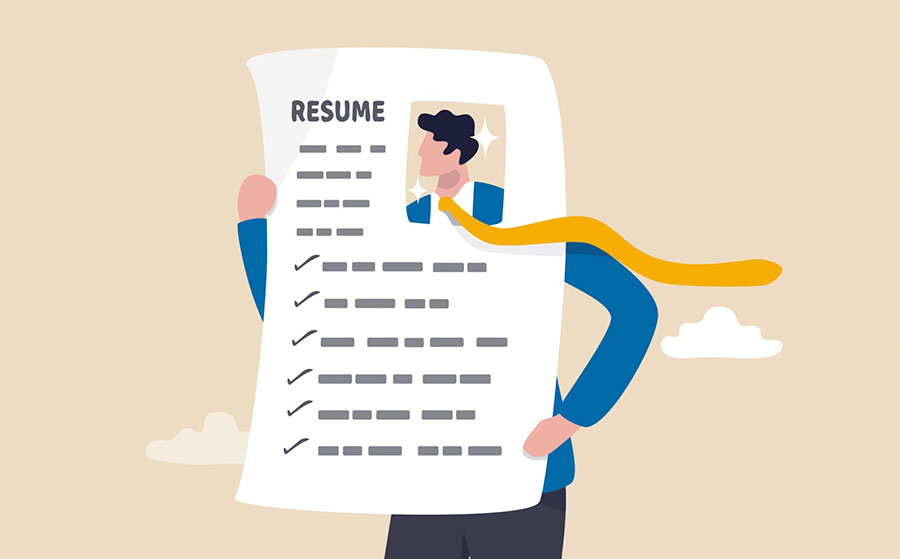
By: Greg Gardner, Laurus College Career Services
We’ve all been there. applying to jobs, any job, in the hope of getting a phone call. It’s frustrating. It’s mind-numbing. It takes a toll on your psyche.
The job search process has been taking its toll on individuals for decades, but the basics haven’t changed. Employers are still looking for people who can do the job and be a good fit within the organization. The good news is that searching for a job is not rocket science. If done correctly, you can manage your job search with a minimum of aggravation.
There are times in even the best of circumstances (not counting pandemics!) when quality candidates have difficulty getting noticed. Searching for a job can take longer than expected. It’s hard to get up every day and stay positive not knowing if your actions are moving you towards your goal. So, I wanted to address some of the ways you can get the job search train back on track and moving forward with a different attitude.
It’s about taking care of yourself both mentally and physically
Finding a good job is the culmination of doing a lot of different things properly. It’s about taking care of yourself both mentally and physically. Job searching is stressful, but if you know what you are doing and how you are doing it, you can take away some of that stress.
Setting Your Goals
When you set a long-term goal you can focus on the desired outcome or you can focus on the particular actions that are required to get there. The focus on actions involves setting a process goal rather than an outcome goal.
A lot of young people these days want to be YouTube stars, but they don’t put a lot of thought into how they will make that happen. The outcome becomes much harder to attain because there was no plan or process on how to get there.
Process goals are particularly valuable during a long job search. No matter how long it has been since you started looking for a job the activities you need to engage in to be successful are the same.
- Check for job openings and apply for positions that match your experience and skills.
- Attend networking events to get to know potential employers and possible referrals.
- Talk to friends and colleagues to discover upcoming openings.
- Take online webinars to improve your skills.
- Read all you can to stay current in your field.
- Practice your interview skills.
Process Goal Advantages
A focus on process has two advantages. First, you are likely to be less frustrated about the job search when you are paying attention to the specific actions you need to take. You may not succeed at getting a job on any particular day, but you may have succeeded at applying for new positions, meeting new people, or learning new things. As a result, you are experiencing small successes on your way to the big prize, getting hired.
The most successful people are those who stay focused on the day-to-day activities that add up to their long-term goals
Second, many of the things you need to do to get a job are things you need to do after you get hired as well. Keeping up with the latest advances in your field is an important part of your success. If you develop habits to read and learn new skills, you’ll retain the benefits of those activities even after you start a new job. As a result, you are laying the groundwork for your future success.
Ultimately, the most successful people are those who stay focused on the day-to-day activities that add up to their long-term goals. This is true whether you’re tackling a large project or trying to find a job. Instead of getting frustrated focus on the job search process, not just the outcome.
Review Your Resume

A resume is a fluid document that needs to be adjusted for each job you apply to
To re-energize your job search, let’s review some of the basics. First, let’s talk about your resume. A resume is a fluid document that needs to be adjusted for each job you apply to. It needs to be an honest reflection of what you have done and what skills and knowledge you bring to the table.
It should include:
- Contact information
- Relevant work and volunteer experience
- Relevant educational degrees or certifications and/or licenses
- Relevant skills and your level of mastery
- Use as few words as possible
- Quantify your accomplishments whenever possible
- Keywords and phrases that employers are using in their job descriptions
And please proofread it several times to catch any typos and misspellings!
Interviewing Basics
Back in the pre-pandemic days interviewing was generally broken into two parts:
- Phone interview
- The nerve-wracking face-to-face interview
Because of the pandemic, we have seen phone interviews become more important and face-to-face have become virtual affairs. Remember that you only get one shot at giving a good impression on that phone interview. So when you are in job search mode and you have applied to numerous postings, you must be prepared to give an interview at a moment’s notice when your phone rings. One of the best ways to be prepared is to practice answering questions and have some answers ready to go. There’s no guarantee of what questions you will be asked, but you can bet they all have something to do with:
- Your skills and knowledge
- Your education and work experience
- Your personality traits and what motivates you
You must be prepared to give an interview at a moment’s notice when your phone rings
To be prepared to answer these. You need to know your resume inside and out. After all, that’s what they are basing a lot of their questions on.
Remember, it goes back to:
- Can you do the job or learn it quickly?
- Would you be a good fit for the team already there?
Do your best to remember some of the highlights from the job posting and steer your answers in that direction. Always research the company ahead of time so you have some idea of the size of the company and what they do best. You should be applying to positions you match up well with, so talking about how you can help them should be fairly easy. An interview is you telling them that you can help, you have skills which they need and you want to be a part of their team.
Re-Energizing Your Search

So let’s get down to the reason why I’m writing this piece. I work with people daily helping them find jobs. I hear their stories about applying and interviewing. Days, weeks, sometimes months of doing their best to follow the process, and still no results. It’s frustrating and often heartbreaking knowing that these people deserve an opportunity, and would be an awesome employee, but are just not given a chance. I wanted to be able to share some of the small ways to keep it together when it seems like your life is falling apart.
Keep Your Sanity
When conducting a job search, you need all your ducks in a row, we have already talked a little about your resume and interviewing, about the process as opposed to the outcome. Let’s talk about how to maintain a positive attitude throughout this time.
First off, understand that nothing lasts forever. At some point, you will be employed again and all your free time you are experiencing will go right out the window. So make use of it! You need to create a scheduled time to look for work, but also schedule some time to take care of yourself. Your well-being is equally important to getting a paycheck. So when you are not grinding on online applications and networking, what can you be doing to keep your sanity?
Make Some Changes
If someone is not being supportive in your time of need, perhaps it’s time to put a little distance between you
You probably know by now that some people are supportive and others are highly critical. If someone is not being supportive in your time of need, perhaps it’s time to put a little distance between you. Right now you need people who have your back. You don’t have to push people away, but this is a good time to interact with those that make you feel better.
Think Positive Thoughts
Positive self-talk is a skill we could all do better. It’s one of those bay step kind of things. You just have to keep at it, but the results are calming.
- “This is only a temporary setback.”
- “I am the same smart successful person as I was before.”
- “I will make it through this tough time period!”
Create your own mantras and continue to repeat them, especially when the negative thoughts start to creep in.
Find Your Inner Strength

Now’s the time to dig deep inside yourself. Coat yourself in the armor of perseverance, fortitude, and resilience. You’ll be surprised how strong you can become when the time calls for it.
Tune out anything that may get in your way. Turn off the television, put down your phone and go for a walk outside to clear your head. Stop excessively gaming, drinking, binge-watching Netflix, and fighting with everyone around you and on social media.
Most people handle stress and unfortunate circumstances with a knee-jerk, panicked response
You can control how you view, process, and react to events. Most people handle stress and unfortunate circumstances with a knee-jerk, panicked response. They dwell on negative thoughts.
Instead of getting stuck on the hamster wheel, take a deep breath and pause. Then, analyze the situation. Look at it head-on with clarity and objectivity. “Is this really bad or am I overreacting?” Even if you’re in a tough spot, you need to find the mental fortitude to think of positive solutions to make things better.
It’s Not Failing—It’s Just a Do-Over
The only people who haven’t encountered setbacks are those who never took any chances
We’re all afraid of failing. It’s not such a big deal. The greatest entrepreneurs, business people, athletes, politicians, and celebrities had epic failures and still rose to greatness. Everyone experiences setbacks at one time or another. The only people who haven’t encountered setbacks are those who never took any chances. There will always be bad breaks, heartaches, and dashed hopes.
The trick is to get back up again, brush yourself off, and keep on moving forward. Keep in mind—the more you try to achieve something, the greater amount of times you’ll fail. That’s okay, as it’s part of the process. Failing is a way to learn from your mistakes. Take stock of what you did right and the mistakes you made along the way. Then, focus on what you need to do to improve and grow, so you can succeed the next time around. You either win or learn. Life is one big learning session. The lessons learned from falling down will help pick you up in the future.
Engage with People
When you are experiencing career-related challenges, that’s the time to engage with people
When you experience a career setback, it’s natural to withdraw. You don’t want to have to tell your family and friends that you lost your job or the promotion you told everyone about didn’t materialize. To avoid awkwardness in social settings, people pull back. They withdraw into a cocoon in their sanctuary, which is home.
This is the direct opposite of what you need to do. When you are experiencing career-related challenges, that’s the time to engage with people. You need to let others know what’s happening; they may have some answers for you or leads on new opportunities. They may have been down the same road and have some wisdom to impart. It feels better to get things off of your chest by sharing with others.
If you stop taking proactive actions, you actually move backward. In science, an object in motion stays in motion. Once something stops, it’s hard to start up again. You need to keep pushing forward—even if you only want to pull the covers over your head and stay in bed all day.
Think of What’s Next

Without the arduous commute and all the distractions at the office, you’ll have the peace and quiet to contemplate. Assess how you spent your pre-coronavirus time. Were you happy and pursuing something meaningful that offered intrinsic value?
While you’re searching for a job, consider all other options. Practice having a growth mindset. Maximize this mandatory sheltering at home to think about how you can be the best version of yourself. If you’re unable to procure a job in your chosen field, start contemplating a career pivot or reinvent yourself.
We’ve all learned the hard way that life is fragile and fleeting. We have short, precious time here and it could all go in an instant. Focus on a career that matters to you.
Keep Busy
In addition to your job search efforts, remember to practice self-care
Maintain a daily routine to stay focused and have a semblance of normalcy. In addition to your job search efforts, remember to practice self-care. Find hobbies and activities that allow you to decompress and get your mind off of the job search. You can read, do a little yoga, some push-ups, sit-ups, jogging in place, walk around the block, or any other activities that you like. Try brushing up on your job related skills such as writing an effective email, learning to touch type, and building your soft skills.
Try practicing a little meditation and deep breathing exercises to decompress and chill out. Get a sufficient amount of sleep and avoid excessive amounts of alcohol, drugs, and junk foods that will worsen your mood and make you feel sluggish.
Take time to reacquaint with your spouse, children, extended family, friends, high school and college buddies, and former co-workers. This is a perfect time and excuse to connect with people that you haven’t seen in a while. It will improve your mood to see a long-lost relative or childhood friend on a Zoom or FaceTime chat.
Don’t Beat Yourself Up
When you’re searching for a new job, focus on the things that you can control
About 55 million Americans have filed for unemployment since the pandemic started. This doesn’t count all those who were previously unemployed and woefully underemployed people. It’s not the time to expect an easy ride. This is when we do our best to just get out of bed and make it through the day.
When you’re searching for a new job, focus on the things that you can control. Try not to ruminate and stress out over all of the parts of the interviewing process that are far outside of your control. Simply focus on each step and take it one day at a time. Cut yourself some slack. You’re running a marathon and not a sprint. It will take a lot of strength and endurance. It’s natural to feel fatigued and defeated. So be good to yourself, do something nice for yourself every once in a while. This too shall pass.
Eat Properly
When out of work, eating properly is one of the best ways to stay focused
It’s so easy to down a quart of Haagen-Dazs when feeling depressed. Gaining weight is one of those slippery slopes where when it starts to happen, the train moves faster off the rails. When out of work, eating properly is one of the best ways to stay focused. It gives you energy and also requires you to make good choices regularly. That’s not to say a little reward is not merited every once in a while. But if you maintain a good diet, you feel good and that transfers to how you approach the day.
Remember That You’re Remarkable

It’s common to lose confidence when things aren’t going your way. You start doubting and second-guessing yourself and all of your decisions.
When this starts happening, recall all of your past accomplishments—big or small. Stop ruminating and recite all of the reasons why you’re special. List the exceptional skills and wonderful experiences that you have to offer to prospective employers.
Get in Touch
The Career Services Department at Laurus College is committed to student success and offers a variety of services to assist students in identifying a new career. Be sure to use us to your advantage in your search for the perfect job. Get a head start on your future today by scheduling an appointment with one of our Career Services Coordinators!
[author_bio]
